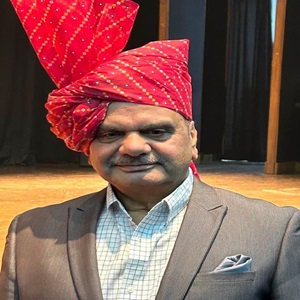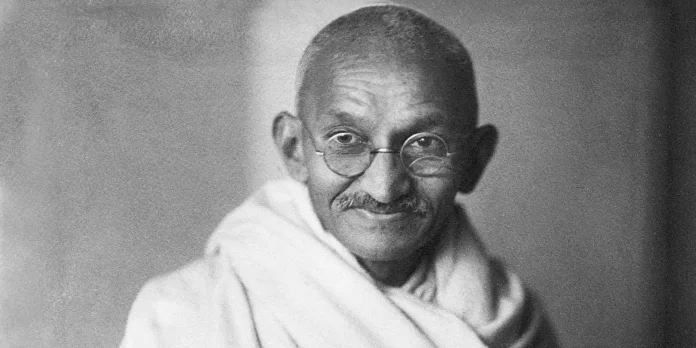By Ashok Bhan
Mahatma Gandhi, an icon of peace, societal harmony, and unity, continues to inspire and guide the world even decades after his assassination. On this solemn occasion of his remembrance, we pay homage to the man who stood as an unwavering symbol of non-violence and righteousness. His life, teachings, and sacrifices continue to resonate, offering invaluable lessons for our turbulent times.

In today’s world, characterized by conflicts, proxy wars, and the looming threat of catastrophic weapons, Mahatma Gandhi’s principles of love, truth, justice, and respect for others’ rights hold more significance than ever before. The relevance of his teachings is a beacon of hope in our pursuit of global peace.
Gandhi, whose frail body was committed to the flames on January 30, 1948, is far from being forgotten. His legacy endures as a testament to the indomitable human spirit. His cremation alongside the graves of kings in Delhi was fitting, for he was the kingliest of all kings. His life was a remarkable amalgamation of a warrior’s courage, a prophet’s wisdom, and a saint’s compassion, all underpinned by his humility and commitment to universal peace and the “live and let live” doctrine.
The name, Mahatma Gandhi, has become synonymous with equality, justice, and the liberation of oppressed peoples. He ignited the flame of liberty and peaceful coexistence, serving as an inspiration to millions. In these troubled times, his teachings remain a guiding light for humanity.
C. Rajagopalachari once remarked, “Bharatmata is writhing in anguish and pain over the loss. No man loved Bharatmata and Indians more than Mahatma Gandhi.” His tragic death was a powerful reminder of his unwavering dedication to his principles. He died standing, not even sitting down, on his way to prayer, demonstrating his unyielding commitment.
Pandit Jawaharlal Nehru eloquently stated, “He spread out over India, not in places only, or in select places, or in assemblies, but in every hamlet and hut of the lowly and those who suffer.” Gandhi’s impact was not limited to a select few; it reached every corner of India and every stratum of society. His memory lives on in the hearts of millions, and his teachings continue to inspire generations.
Sardar Vallabhbhai Patel recognized that Gandhi’s teachings would persist beyond his mortal frame, stating, “Gandhiji’s supreme sacrifice will wake up the conscience of our countrymen and evoke a higher response in the heart of every Indian.” Even in death, Gandhi’s ideals held the power to unite and guide the nation.
Maulana Abdul Kalam Azad emphasized the importance of unity and collective effort in carrying forward Gandhi’s burden. He believed that by sharing the responsibility, millions of Indians could accomplish miraculous feats.
Mohammad Ali Jinnah, though often at odds with Gandhi, acknowledged the nobility of his death, stating, “He died in the discharge of the duty in which he believed.” Gandhi’s commitment to nonviolence was unwavering, even in the face of his own tragic end.
Dr Rajendra Prasad defended Gandhi’s intentions, affirming, “Can we ever dream that Gandhiji was bringing harm to the Hindus or to their religion?” He emphasized that Gandhi was a liberator and a unifier, dedicated to the welfare of all.
Dr S. Radhakrishnan mourned Gandhi’s death and highlighted the need for his teachings in a world filled with violence and chaos. He expressed hope that the world would someday be safe for saints like Gandhi.
Sri Aurobindo’s words echoed a vision of a united India and the enduring legacy of Gandhi’s struggle. He believed that Gandhi’s light would continue to shine until it achieved the goal of unity.
Lord Mountbatten recognized Gandhi’s loss as a tragedy for all of humanity, emphasizing the need for love and tolerance, ideals for which Gandhi had tirelessly striven.
Albert Einstein marveled at Gandhi’s unique qualities, calling him a leader who eschewed violence, relied on the power of truth, and uplifted his people through compassion and wisdom. He believed that future generations would find it hard to believe that such a remarkable individual had once walked the earth.
The Dalai Lama, a proponent of non-violence himself, found immense inspiration in Gandhi’s life and principles. He spoke of the importance of nonviolence, compassion, and kindness, values that Gandhi personified. He emphasized the need to educate future generations in these virtues to honour Gandhi’s legacy.
In contemporary India, with a population of over 1.3 billion, Mahatma Gandhi’s spirit lives on in every heart as the ultimate unifier and visionary leader. His words on the Kashmir conflict resonate deeply, underscoring the importance of nonviolence, equitable humanitarian development, and societal harmony in safeguarding human rights and preserving peace.
Mahatma Gandhi’s exceptional life personified the principles of peace, societal equanimity, and unity. As we commemorate his legacy today, we honor a man whose influence transcends time and borders. His teachings continue to guide us towards a world where nonviolence, compassion, and mutual understanding prevail. The nation salutes the great Mahatma – the Father of the Nation, whose light continues to shine brightly in our hearts.
—The writer is a Senior Advocate in the Supreme Court


